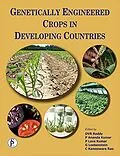World population is estimated to increase to 9.5 billion by the year 2050, with 80 per cent living in the developing countries. The additional demand for food on account of increasing population and altered consumption patterns would put more pressure for at least doubling the current levels of food production. Stagnated agricultural production, poor progress in agricultural innovation to increase output, unchecked pre- and post-harvest losses, and the lack of scope for increasing arable land and irrigation, push all countries into a critical phase. It is an urgent necessity for developing countries to implement measures to enhance food production through a more efficient use of land and water and adopting modern technologies to meet with the future demands. In this context, the genetically engineered (GE) crops offer a great promise. Introduced in 1996 on 1.75 million hectares, GE crops were cultivated on 175 million hectares in 27 countries, including 19 developing countries, in 2013. Pest tolerant Bt crops have immensely benefitted such countries as China and India, significantly reducing the application of synthetic pesticides and enhancing crop output to impressive levels. The biosafety and environmental safety of GE crops were demonstrated by about 30 years of research and 18 years of cultivation experience. GE crops are not being projected as an exclusive solution to meet the future demands on food, but only as the most efficient of modern technologies. A judicious combination of integrated pest management and improved technologies that lead to new generation crops with enhanced nutritional potential is the need of the hour. This volume contains 13 reviews on the current global position on various scientific issues and interrelated societal and political matters relevant to the development of GE crops in developing countries. There is a focus on the control of crop viral diseases, an area that did not receive its due. This volume is designed to address politicians, policy makers, bureaucracy, young scientists, students, teachers, the general public and more importantly the judiciary and the media, to project the factual position on the safety and benefits of GE crops and to counter the misinformation that is being spread to mould governmental policy and public opinion against GE crop technology.
Autorentext
D.V.R. Reddy, obtained PhD from the University of Illinois, Urbana-Champaign, USA in 1966 under the world renowned virologist Dr LM Black. He worked as Post Doctoral Associate at the University of Illinois from 1970 to 1975. He joined the International Crops Research Institute for the Semi-Arid Tropics (ICRISAT) in 1976, initially as groundnut virologist and subsequently in 1980 as a Principal Virologist and Leader of Virology Program. He retired from ICRISAT in 2001. He served as a Visiting Professor: University of Georgia, Griffin, USA 1982 and 1993; at the University of Kentucky, Lexington in 1991-92; as a Visiting Scientist at the Scottish Crop research Institute, UK in 1983 and 1992; and as a consultant at the Donald Dan forth Plant Science Center, St Louis, USA from 2002 to 2005. Published nearly 200 papers in many highly reputed journals, text books and special editions on selected topics. He chaired sessions at the meetings organized by the International Virological Society, Association of Applied Biologists, British Society for Plant Pathology, American Peanut Research and Education Society, Indian Phytopathological Society and Plant Protection Association of India. He was recipient of several grants for Special Projects, on Plant Viruses and Mycotoxins, from the USA, UK, Belgium, Netherlands and Japan. He received several meritorious awards
Dr P. Ananda Kumar is currently Director, Institute of Biotechnology, Acharya NG Ranga Agricultural University, Hyderabad and Former Director, National Research Centre on Plant Biotechnology, New Delhi. He obtained M.Sc degree in Botany from Sri Venkateswara University, Tirupati. He joined as a Scientist in the Agricultural Research Service of Indian Council of Agricultural Research (ICAR) in 1978. He obtained Ph.D degree in Plant Physiology from Indian Agricultural Research Institute (IARI), New Delhi. After working as Alexander von Humboldt Fellow in the University of Hannover (1991-92), he moved to Biotechnology Centre, IARI, in 1993. He specializes in the area of transgenic development for insect resistance utilizing the genes encoding insecticidal proteins of Bacillus thuringiensis. Dr Kumar developed fruit borer resistant brinjal and tomato, which
were licensed to private companies. Dr Kumar published over 150 research articles, books and book chapters. He has three patents on codon-modified and chimeric Bt genes. His other research interests include functional genomics of brinjal, ragi and cotton. Dr Kumar serves as the Secretary of the Society for Plant Biochemistry and Biotechnology, India and as an Editor, GM Crops and Food.Dr P. Ananda Kumar is currently Director, Institute of Biotechnology, Acharya NG Ranga Agricultural University, Hyderabad and Former Director, National Research Centre on Plant Biotechnology, New Delhi. He obtained M.Sc degree in Botany from Sri Venkateswara University, Tirupati. He joined as a Scientist in the Agricultural Research Service of Indian Council of Agricultural Research (ICAR) in 1978. He obtained Ph.D degree in Plant Physiology from Indian Agricultural Research Institute (IARI), New Delhi. After working as Alexander von Humboldt Fellow in the University of Hannover (1991-92), he moved to Biotechnology Centre, IARI, in 1993. He specializes in the area of transgenic development for insect resistance utilizing the genes encoding insecticidal proteins of Bacillus thuringiensis. Dr Kumar developed fruit borer resistant brinjal and tomato, which were licensed to private companies. Dr Kumar published over 150 research articles, books and book chapters. He has three patents on codon-modified and chimeric Bt genes. His other research interests include functional genomics of brinjal, ragi and cotton. Dr Kumar serves as the Secretary of the Society for Plant Biochemistry and Biotechnology, India and as an Editor, GM Crops and Food.
